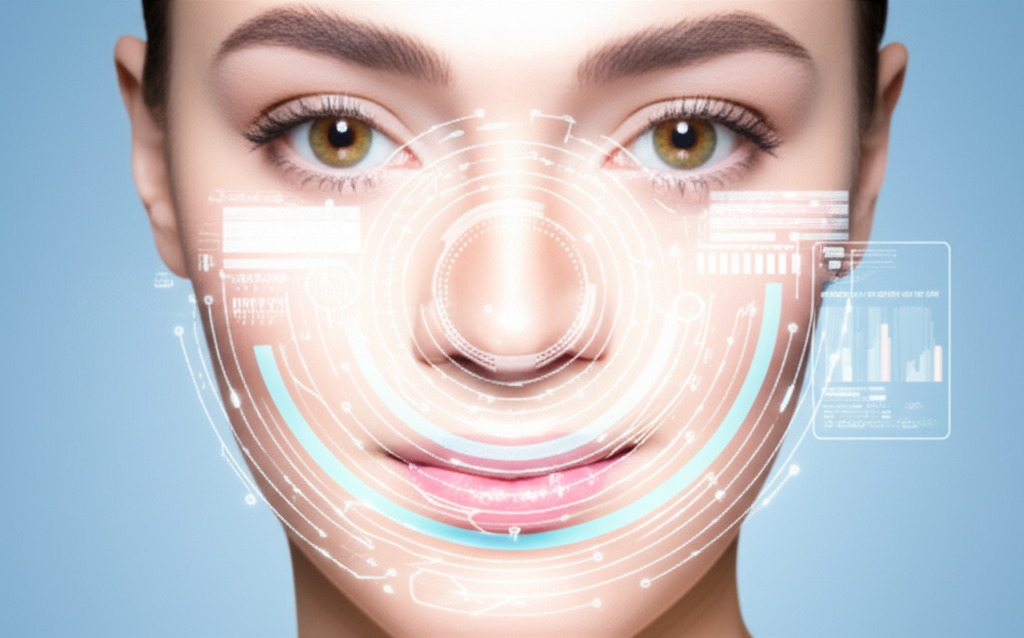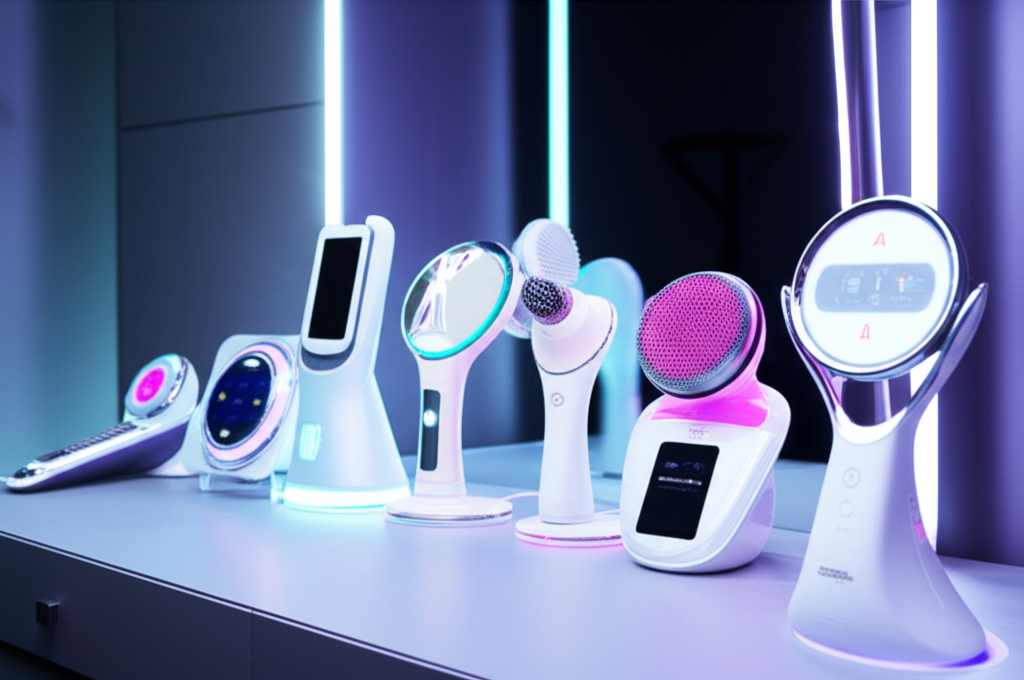The beauty and skincare industry is on the cusp of its most significant transformation yet. For years, people relied on general advice or products for broad skin types. However, this approach often falls short. Generic skincare routines can miss specific individual needs. This frequently leads to frustration and wasted effort. Many find what works for one person simply doesn’t work for another, even with similar skin concerns.
AI is now changing this dynamic completely. Indeed, it acts as a revolutionary force. AI makes skincare incredibly personalized, remarkably efficient, and far more accessible than ever before. Imagine having a dermatologist and a cosmetic chemist right in your home. This technology moves beyond guesswork. It provides precise insights into your unique skin. In fact, a recent report by Statista shows the global AI in beauty market size is growing rapidly, projected to reach over $5 billion by 2030.
These aren’t just fancy gadgets. Instead, AI-powered skincare devices represent the intelligent future of how we understand and care for our skin. They are poised to become ubiquitous in our daily lives.
This article will explore how AI analyzes your skin. It will detail specific categories of these innovative devices. Moreover, it will discuss what the future holds for this exciting field.
The Dawn of Personalized Skincare: How AI is Reshaping Routines
Skincare has long faced a significant challenge: individuality. Each person’s skin is unique, influenced by genetics, lifestyle, and environment. Therefore, a “one-size-fits-all” approach, or even basic skin type identification, rarely delivers optimal results. For example, classifying skin as merely “oily” or “dry” ignores crucial nuances like sensitivity, redness, or specific acne triggers. This lack of precise understanding often leads to ineffective product choices and prolonged skin issues.
Beyond One-Size-Fits-All: The AI Diagnostic Edge
AI-powered devices overcome these limitations. They use advanced sensors and high-resolution imaging. This allows them to perform precise, real-time analyses of your individual skin condition. These sensors detect:
- Moisture levels: How hydrated your skin truly is.
- Sebum production: The exact oiliness of your skin.
- Elasticity: Your skin’s firmness and bounce.
- Pore size: Visibility and congestion.
- UV damage: Sun-induced spots or texture changes.
- Redness: Inflammation or irritation.
What kind of data do AI skincare devices collect?
AI algorithms interpret this complex data. They identify specific concerns which the naked eye might miss. For instance, AI can detect subtle signs of dehydration before you even feel it. Accompanying apps then create detailed ‘skin maps.’ These apps track changes over time, offering objective progress reports. Consequently, this helps you see if your routine is working.

Tailored Treatments at Your Fingertips
The diagnostic data then feeds into AI algorithms. These algorithms recommend specific products, ingredients, or customized treatment protocols. Such recommendations are unique to your current skin state. Thus, if your skin is drier today due to weather, the AI might suggest a different moisturizer.
Some devices use AI to dynamically adjust treatment. For instance, an AI-guided LED mask might change its light wavelength. It adapts based on real-time feedback from your skin. Microcurrent devices, additionally, use AI to deliver adaptive current. This ensures maximum effectiveness and comfort.
Furthermore, AI helps prevent overuse or improper application. This consequently leads to safer and more consistent results. Therefore, you can find high-tech at-home versions of professional devices with these smart features.
Can AI-powered devices adapt to my skin’s changing needs?
Yes, many AI devices use real-time feedback. They adapt their treatments dynamically. This ensures your routine evolves with your skin.
Key AI-Powered Skincare Devices Set to Dominate the Market

The market is seeing a surge in sophisticated AI-powered skincare tools. These devices fall into several categories. Each category offers unique benefits and applications.
Smart Skin Analyzers & Diagnostic Tools
These tools are at the forefront of personalized skincare. They include handheld scanners, smart mirrors, or camera-based apps. They provide deep insights into your skin’s condition.
Key features often include:
- Detailed analysis of hydration and oiliness.
- Assessment of pore visibility and size.
- Measurement of wrinkle depth and fine lines.
- Identification of dark spots and hyperpigmentation.
- Tracking of acne lesions and redness.
- Overall skin health scores for easy understanding.
For instance, devices like the Foreo LUNA range integrate skin analysis features directly into their cleansing brushes. Furthermore, more advanced smart mirrors, often found in beauty stores, can scan your face and track changes over weeks or months.
AI-Integrated Treatment Devices (LED, Microcurrent, RF)
Existing skincare technologies are getting a significant boost from AI. Devices using LED light therapy, microcurrents, or radiofrequency (RF) energy are becoming smarter.
AI ensures optimal device use. For example, an AI-guided LED mask targets specific areas with precise light wavelengths. It adjusts based on your skin condition. Microcurrent devices, additionally, use AI to deliver adaptive current. This ensures maximum effectiveness and comfort.
Furthermore, AI helps prevent overuse or improper application. This consequently leads to safer and more consistent results. Therefore, you can find high-tech at-home versions of professional devices with these smart features.
Personalized Product Dispensers & Formulators
Imagine having a custom skincare product made just for you, right in your home. This concept is becoming a reality. These devices create custom serums, moisturizers, or masks on demand.
They utilize sensor data from your skin analysis. Additionally, they consider environmental factors like local pollution levels. They also factor in user preferences. Then, they mix fresh, precise formulations.
The benefits are clear:
- Reduced product waste.
- Maximized ingredient potency, as products are freshly made.
- Truly bespoke solutions tailored to your daily needs.
For example, concepts include ‘beauty blenders’ that mix ingredients. Some devices even print personalized masks based on your facial contours and skin needs.
Virtual Skincare Assistants & Apps
AI skincare is not just about physical devices; the software side is just as powerful. Virtual skincare assistants and apps serve as the brain for many physical devices. They create a holistic AI skincare ecosystem.
Their features often include:
- Virtual try-ons for makeup and skincare products.
- AI-driven product recommendations based on comprehensive skin analysis.
- Personalized routine trackers that remind you when to use products.
- Progress photo analysis, highlighting improvements over time.
These apps connect seamlessly with physical devices. They provide a comprehensive view of your skin journey. They also offer guidance for achieving your skincare goals.
Are there any free AI skincare apps I can try?
Many brands offer free versions of their apps. These often include basic skin analysis tools and product recommendations. However, they usually require a purchase of their physical device for full functionality.
The Future is Now: What to Expect Next
The journey of AI in skincare is only just beginning. We can anticipate even more sophisticated and integrated solutions in the near future.
Seamless Integration with Smart Homes & Wearables
Skincare devices will soon become part of a broader health and wellness ecosystem. Imagine them integrating with your smart home. Smart mirrors could provide daily skin analysis as you get ready. Fitness trackers could share lifestyle data. This data will impact your skincare routine.
Moreover, environmental sensors might influence your daily regimen. For instance, your device could adjust your routine based on local humidity or pollution levels. This creates a truly connected wellness experience.
Advanced Predictive Analytics & Preventative Care
AI will move beyond just reacting to current skin issues. It will predict future problems. This includes analyzing your lifestyle, genetic predispositions, and historical skin data. It will then recommend preventative treatments or lifestyle changes. This helps avert issues before they even arise. For example, AI might suggest increasing antioxidant intake if it predicts increased oxidative stress.
- How will AI protect my personal skin data?
Data privacy is a key concern. Reputable companies use strong encryption and anonymization methods. They adhere to strict privacy regulations like GDPR. Therefore, always check a brand’s data policy.
Accessibility and Affordability
As with most advanced technologies, AI skincare will become more affordable over time. This will make sophisticated, professional-grade treatments commonplace in the average household. The democratization of this technology means personalized care can reach a wider audience. This includes individuals in remote areas, regardless of geographical location. Consequently, this global reach will truly revolutionize skincare access.
Embracing the AI Skincare Revolution Responsibly
The rise of AI-powered skincare is exciting. However, informed adoption is crucial. Consumers must understand how these devices work. Therefore, research is key before purchasing. Always look into reviews and scientific backing.
These powerful tools are aids, not magic bullets. They should complement professional advice, especially for complex skin conditions. They cannot entirely replace it. Dermatologists and aestheticians, moreover, still play a vital role.
Always choose devices from reputable brands. Indeed, look for those with scientific backing and transparent data policies. Such brands invest in research and safety.
The role of skincare professionals is evolving. They can integrate AI insights into their practice. For instance, AI data helps them track patient progress more objectively. This enhances patient care and treatment personalization. In essence, it’s a partnership between human expertise and technological innovation.
Frequently Asked Questions
Q1: How accurate are AI-powered skin analysis devices?
A1: Many devices offer high accuracy. They use advanced sensors and algorithms. Their precision often surpasses what the naked eye can detect. However, accuracy can vary by brand and device model. Always check reviews and scientific validation.
Q2: Can AI skincare devices replace visits to a dermatologist?
A2: No, AI skincare devices are excellent tools for daily routines and personalized product recommendations. They do not replace a dermatologist’s expertise. A professional opinion is still vital for diagnosing serious skin conditions or complex issues.
Q3: Are AI skincare devices safe for all skin types?
A3: Most AI devices are designed for general use and are safe. However, if you have specific skin conditions like severe eczema or very sensitive skin, consult your dermatologist before using new devices. Always follow the manufacturer’s instructions.
Q4: How do AI devices learn about my skin?
A4: AI devices learn through initial scans and ongoing data collection. They build a profile of your skin’s characteristics. They also track changes over time. Many devices also learn from your feedback on product effectiveness or preferences.
Q5: What’s the main benefit of using an AI-powered skincare device?
A5: The main benefit is hyper-personalization. These devices offer tailored routines and product recommendations. They adjust to your skin’s changing needs. This leads to more effective results and reduces guesswork in your skincare journey.
Q6: What is the typical price range for these devices?
A6: The price range varies widely. Basic handheld analyzers can cost under $100. More advanced treatment devices or smart mirrors can range from a few hundred to over a thousand dollars. Prices are becoming more accessible as the technology advances.
Q7: Do AI skincare devices require a subscription?
A7: Some devices offer basic functionality without a subscription. Others might require a subscription for full access to advanced features, personalized routines, or exclusive product formulations. Always check before purchasing.
Q8: Can AI skincare devices help with specific concerns like acne or anti-aging?
A8: Yes, many AI devices focus on these concerns. They can analyze factors related to acne (e.g., oiliness, inflammation) or aging (e.g., wrinkles, elasticity). They then recommend targeted products or treatments to address them effectively.

